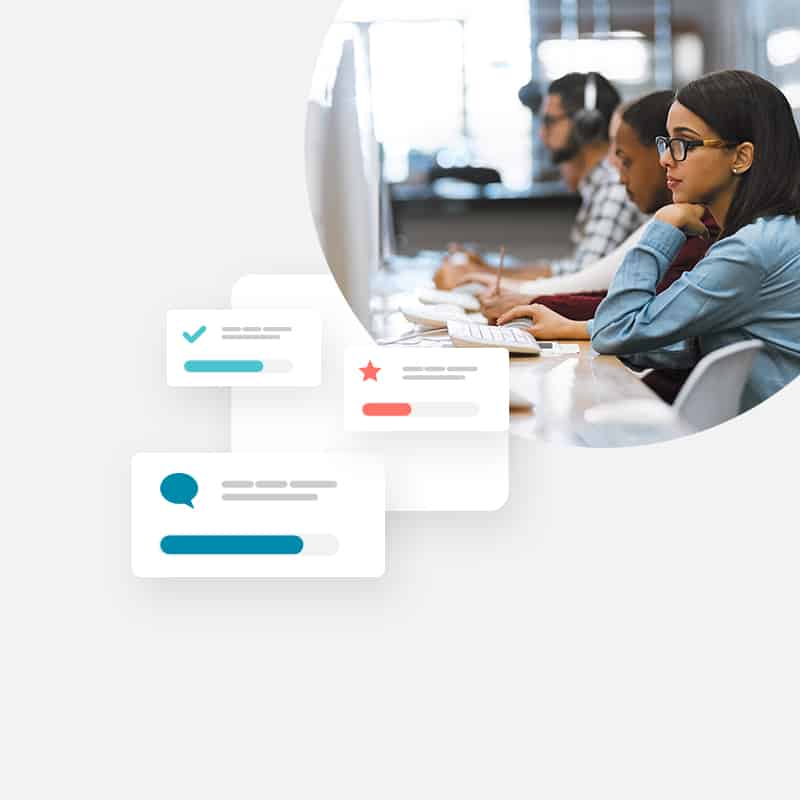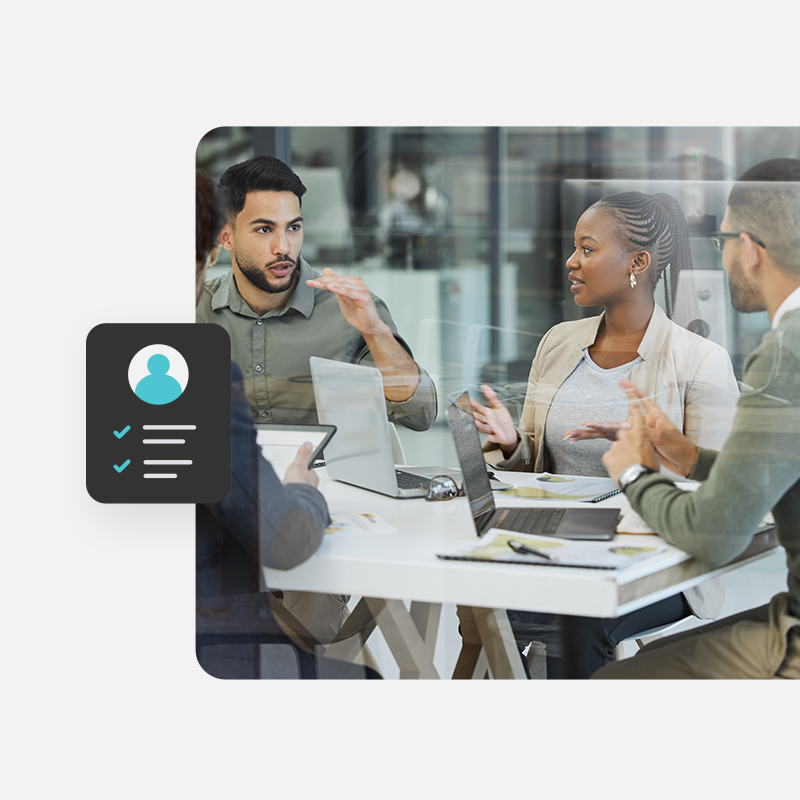- The importance of leadership development for businesses
- 3 benefits of virtual leadership development activities
- Find the right HR platform for virtual leadership development
- How to use your HR platform to track virtual leadership development activities
- 9 great examples of virtual activities for leadership development
- Build the future with virtual leadership development activities
Digital transformation has revolutionized every aspect of HR strategy, including the tools and platforms you use to prepare people for leadership roles in the business. Employees have more access than ever to virtual leadership development activities, which can create a hugely positive impact on your succession planning strategy.
Find out why virtual leadership development activities are a core part of succession planning and how to manage them through your HR software. You’ll also learn about all your options for leadership development programs.
The importance of leadership development for businesses
No business can survive without effective leadership. Identifying and developing the right people to take on leadership roles is one of the most important elements of your workforce planning process.
Every business should prioritize training top leadership candidates to fill top roles before today’s leaders depart. With leadership succession candidates in place, you can make long-term plans for driving business success.
The skills leaders need are evolving all the time, so you need a calculated learning and development plan to make sure that you’re creating well-rounded candidates with the right skills and abilities to lead your business into the future.
You also increase engagement by providing learning and development opportunities for high-potential employees. They’ll feel a sense of progress and purpose, encouraging them to stay invested in the organization.
3 benefits of virtual leadership development activities
A virtual approach to leadership development can improve learning outcomes and the odds of successful succession planning. Check out a few of the biggest benefits of adding virtual activities for leadership development.
Improved accessibility for employees
Traditional leadership development programs occur in person and in real-time, often at company headquarters. Those conditions limited who could attend because not all employees — including some working parents or people with disabilities — had the resources to make traveling practical.
Now that more companies have embraced remote work and virtual learning, those opportunities are available to all employees. Providing access to digital leadership development programs can increase adoption and encourage high-potential workers to pursue leadership roles.
Increased convenience for HR professionals
Virtual activities for leadership development are easier to pull together into a shareable resource for your workforce. Examples include links to webinars, online courses, and announcements about in-house virtual training, all delivered from your integrated HR platform.
The convenience isn’t limited to communicating awareness and opportunities. Virtual leadership development activities typically generate data that you can add into your HR platform, helping you track employee growth and identify the best leadership candidates.
Ability to reach a global audience
Virtual development programs aren’t limited by geography. You can extend the same learning opportunities to every employee across the globe, regardless of their location. On-demand offerings are especially effective for teams distributed across many time zones.
Expanding your leadership training beyond your local zone supports a broader, more diverse leadership pipeline that, in the long run, will produce a more agile and resilient leadership team.
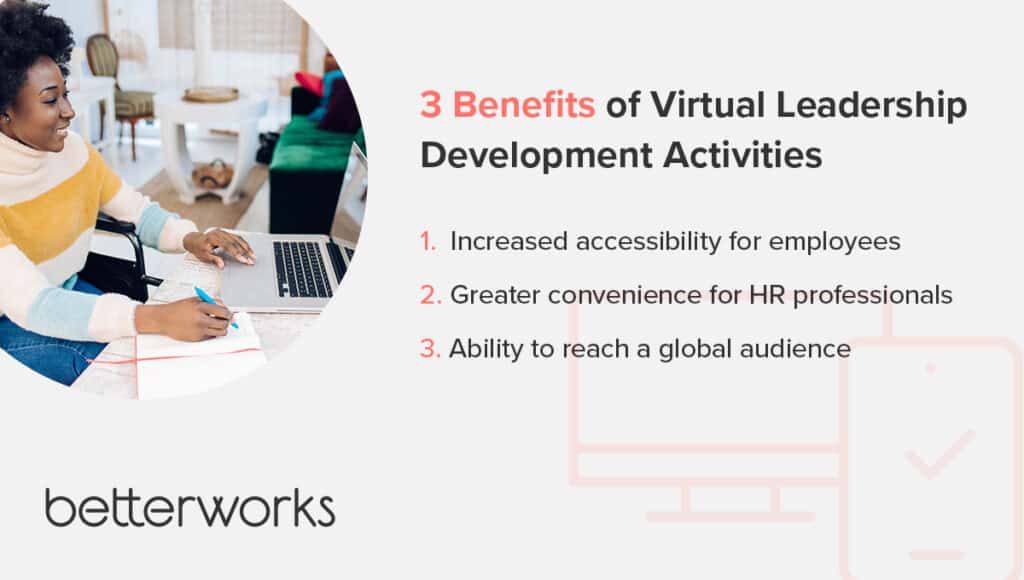
Find the right HR platform for virtual leadership development
Succession planning and leadership development are complex processes with a lot of moving parts. You need an HR platform that pulls all of your leadership development data into a unified dashboard.
Assess the capabilities of your current tech stack. Are there modules for learning? Can managers track their reports’ growth within the system? Does your technology support videoconferencing and other real-time conversation methods? Is your platform configurable to support changing needs and customizations?
Ease of use also matters. Managers and leadership candidates will increase their use of HR platforms that are easy to use and intuitive. If your platform is configurable, develop a leadership training module to pull resources together. You can also prompt program stakeholders to record their activities and what they learned from them.
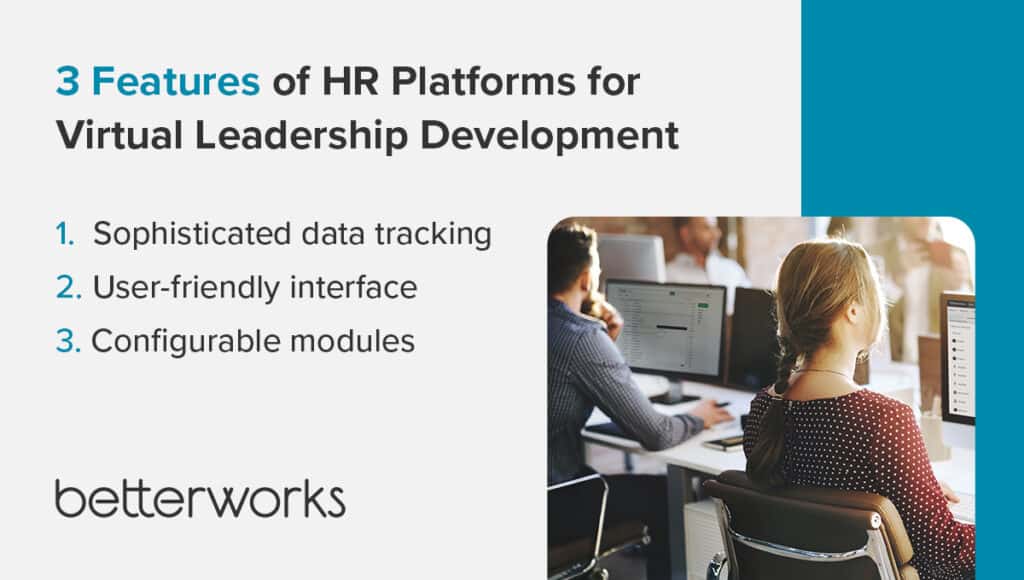
How to use your HR platform to track virtual leadership development activities
As leadership candidates record the activities they participate in, they generate data that offers insights into the success of your development program.
With all of your leadership development data available in one place, you can aggregate, organize, and interpret that data to discover trends. This added intelligence helps you identify programs that have the biggest impact, any programs with low use, and the virtual leadership activities that are producing the strongest leaders.
For example, you might find that webinars are the leadership development activity with the most participation. Armed with this information, you can focus on directing people to the best webinars and training managers to open discussions related to webinar topics during employee performance conversations.
As your HR platform technology evolves, so will the virtual activities for leadership development that your organization uses. Be proactive in improving these programs by tracking metrics such as attendance and dropout, engagement, and average time to completion.
9 great examples of virtual activities for leadership development
The market for online development is booming, and that means that you have more opportunities for building the next generation of corporate leaders. Consider adding these nine virtual leadership development activities to your leadership learning curriculum.
Virtual leadership training workshops
Leadership training workshops are among the most effective virtual development opportunities. Workshops teach concepts while giving participants the opportunity to put them into practice. Workshops are also more likely to have live sessions, allowing participants to ask the instructor questions and interact with their classmates.
Be mindful that live training workshops aren’t practical for everyone. Not every leadership candidate has the flexibility to attend, and global organizations will be challenged to find a time that works for every time zone. Overall, virtual leadership training workshops offer an enriched learning experience for succession planning programs.
Online leadership development courses
Online leadership development courses are integral to an effective development plan. These courses are usually asynchronous, allowing participants to complete course content at their own pace.
Online courses are typically self-led, with leadership candidates consuming pre-recorded and pre-written course materials. Asynchronous delivery makes learning more convenient because participants can access it on their own schedule. However, they probably won’t have access to an instructor to answer their questions.
Your HR platform should integrate with your learning management system (LMS) to track such courses. That learning data should funnel into a single dashboard, making it easy for leadership candidates and HR leaders to track growth.
Virtual mentorship programs
Mentorship programs are a powerful tool for leadership development. Mentors share the knowledge, skills, and expertise they’ve earned over the years with high-potential employees who want to follow a similar career trajectory.
Virtual mentorship programs can connect people across the organization to find the best match of leader and leadership candidate. Delivering the program virtually opens up opportunities to connect across the business, regardless of location or even function.
A rising star in the finance department, for example, might not physically be in the same location as a senior financial leader, but that doesn’t have to prevent mentorship and knowledge-sharing opportunities.
Host conversations between mentors and mentees through your HR platform. Include templates or conversation prompts to enhance mentoring meetings. Create forms for capturing pertinent data from those conversations and make that information available to mentors and mentees alike.
Virtual coaching sessions
These sessions match high-potential employees with a coach who can guide them through the process of identifying, chasing, and achieving their career goals. Coaches focus on offering guidance and advice as candidates decide on career goals and how to reach them.
While mentors are often co-workers, coaches can be employees or contracted through an external coaching service. Internally, direct managers increasingly are acting as coaches to their direct reports. Organizations can also hire virtual coaching services to match employees with the right coach.
However, if you find coaches, look at how you can capture the data from coaching sessions in your HR platform. Combine those insights with other data to identify trends in leadership development.
Webinars on leadership skills
Webinars are a great and flexible option for learning. Webinars come in many varieties, but they’re often free sessions that are 30 minutes to one hour long. Many times, they’re available live or on-demand, adding flexibility for busy leadership candidates.
Organizations such as Betterworks, Harvard Business Review, and the Center for Creative Leadership put out quality content to educate attendees on topics across the leadership spectrum.
Participants can attend webinars and can interact with the presenters and participants in the chat. Or they can watch the recorded webinar on-demand at their own pace. Make sure that your HR platform allows leadership candidates to easily record webinar attendance and the big concepts they learned. Writing about learning can reinforce those concepts, while recording data helps the organization make better leadership development decisions.
Virtual team-building exercises
The best leadership development programs do more than just teach concepts. They also give leadership candidates the opportunity to apply those concepts in practice. Virtual team-building activities reveal how participants fare at communication, critical thinking, and conflict management. You can make these activities fun, like hosting a virtual escape room, to encourage participation and camaraderie.
For example, solving puzzles and challenges together under an up-and-coming leader’s direction builds trust among your people, provides practical experience, and helps leadership candidates hone their problem-solving skills
Online leadership forums and discussion groups
Virtual leadership development doesn’t have to be a formal course or program. Simply interacting with other future and current leaders can provide insights into the different leadership styles available to leaders.
Connect your high-potential employees with online forums and discussion groups focused on business leadership. There are plenty of free forums, while others are available via subscription.
Your HR platform might facilitate forums where you can host discussions among employees, helping leadership candidates connect with and learn from team members across the organization.
Virtual leadership book clubs
Something as simple as reading a book can provide a powerful learning opportunity. Many of the most renowned business leaders have written about their experiences and expertise, providing a wealth of information that inspires and informs future leaders.
Books become even more powerful when shared. There are many public communities focused on analyzing the themes and concepts found in business books. And if you can’t find the right public group, consider forming an in-house book club for your up-and-coming leaders. These remote team meetings give leadership candidates the opportunity to sharpen their critical thinking leadership application skills.
Virtual leadership skills assessments
Assessments are one of the most powerful tools in your learning and development arsenal. By taking a valid and reliable leadership assessment, your top leadership candidates identify their greatest strengths and opportunities for improvement.
Assessment reports provide customized guidance for leadership candidates, who can bring those results to their mentors or coaches. Assessment reports also provide critical data related to your leadership candidates’ competencies. You can house that data in your HR platform to track leadership development outcomes over time.
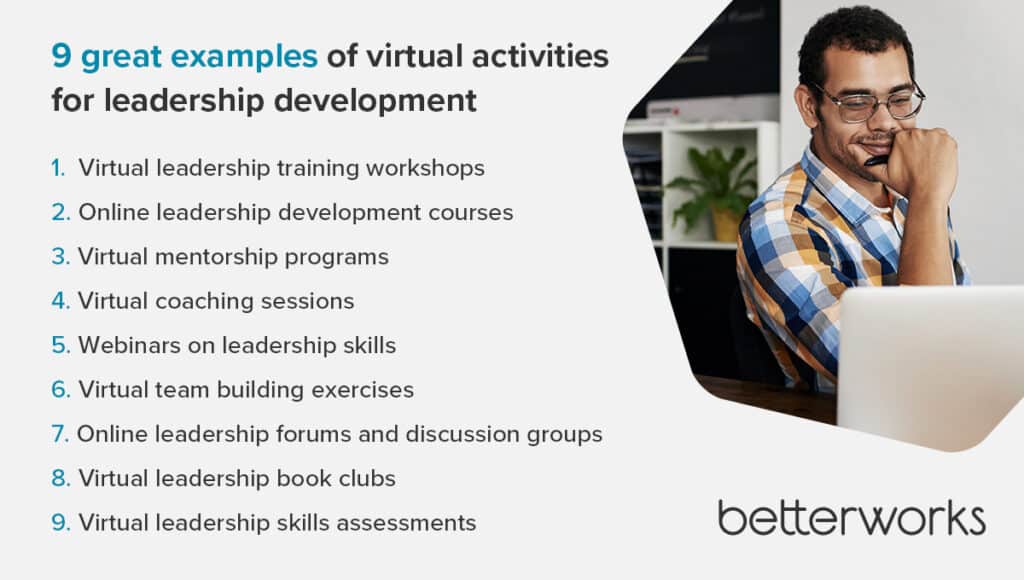
Build the future with virtual leadership development activities
Virtual leadership development activities form a core part of your succession planning program. Take advantage of your HR platform’s capabilities to organize leadership development opportunities, communicate them to leadership candidates, and track their growth over time. You don’t need to be in person to prepare the next generation of organizational leaders.
Need more inspiration? Check out these three reasons to start investing in your people leaders today.
